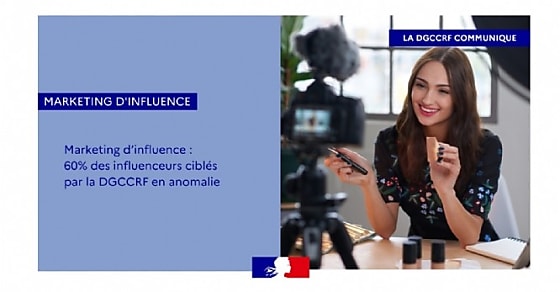
60% of the influencers targeted by the DGCCRF are “anomalous”: according to the Competition, Consumption and Fraud Repression Directorate General, they do not comply with the rules on advertising and consumer rights.
Another downside to influencer marketing! In the spotlight as open a public consultation on the profession of influence and content creation on 8 Januaryr (and until January 31) and that the accusations of scams by some influencers are increasing, Influencer marketing is investigated by the Directorate General for Competition, Consumers and Fraud Prevention (DGCCRF). Of the sixty influencers targeted by the DGCCRF since 2021, 6 out of 10 did not comply with the rules on advertising and consumer rights, reveals the report of the Ministry of Economy dated 23 January 2023.
The influencers examined are not chosen at random: the latter have a very significant number of subscribers or are the subject of reports from consumers and are active in the promotion of products and services such as food supplements, “slimming” programs, cosmetics, or online trading or betting services. Result: all anomalous influencers did not respect the rules relating to the transparency of the commercial nature of their publications. Forget, therefore, the mention “paid company”…
False claims, embezzlement, dropshipping…
Another irregularity detected: some of the influencers – the DGCCRF does not specify the number – have also deceived consumers about the properties of the products sold (false anti-covid claims, organic or natural products that were not, etc.) or has promoted risky products or services, particularly in the field of sports betting, infringing the rules governing such products (and in particular bans on advertising tobacco, alcohol, drugs or dangerous products). “Some influencers have carried out unauthorized promotional operations, such as using the professional training account (CPF) to recover cash or gifts, and then diverting money dedicated to training, or that of injections for aesthetic purposes by beauticians and non-professionals health care, a practice not without health risks, also notes the DGCCRF in a press release. Finally, some influencers who practice dropshipping forget the associated rules, in particular, in this case, their obligations as a seller towards consumers.
These findings have been the subject of several proceedings for calls to order and sanctions, depending on the degree of seriousness of the practices. The follow-up given to the DGCCRF’s investigations will therefore range from the warning to the transmission of the crime report to the public prosecutor, passing through the precautionary measures. For example, concealing the commercial nature of a publication can be punished with two years’ imprisonment and a fine of up to €300,000. “These follow-ups can finally be accompanied by publicity measures that inform the public of the facts observed and the follow-up given”indicates the again DGCCRF, which plans to intensify its controls in the coming months.
This situation shows that better supervision of this new business sector is needed. In 2023 the @dgccrf control actions will continue to protect consumers. Continue to report any deceptive marketing practices on https://t.co/orHLa3bwPO.
– Bruno Le Maire (@BrunoLeMaire) January 23, 2023
#influencers #fail #comply #advertising #regulations #DGCCRF #Influencer #Strategy #Influencers






Comments
Post a Comment